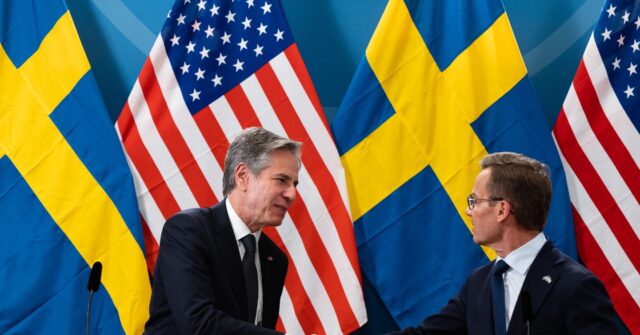In a significant development for European security, U.S. Secretary of State Antony Blinken and former NATO Secretary-General Jens Stoltenberg are set to be honored with knighthoods in Sweden. This recognition comes as a result of their crucial contributions to Sweden’s accession to NATO, a historic move that reflects a major shift in the continent’s defense posture, particularly in light of Russia’s aggressive actions following its invasion of Ukraine. The transition from a long-standing policy of neutrality to joining the North Atlantic Treaty Organization signifies a broader realignment in Europe’s post-Cold War security framework and illustrates the shifting geopolitical dynamics in response to heightened threats.
The Royal Order of the Polar Star is the award being bestowed upon Blinken, Stoltenberg, former Finnish Prime Minister Sanna Marin, and former Finnish Foreign Minister Pekka Haavisto. This prestigious honor is conferred upon foreign nationals and stateless individuals who have made remarkable contributions to Swedish interests. Prime Minister Ulf Kristersson expressed his gratitude on behalf of the Swedish government, highlighting that the recognition serves as an acknowledgement of the significant role played by these individuals in facilitating Sweden’s NATO membership. Their efforts come as Sweden and Finland both made the unprecedented decision to abandon decades of military non-alignment, a stance borne out of historical context following World War II.
The decision to seek NATO membership by both Sweden and Finland can be traced back to evolving security concerns in the region, particularly following Russia’s actions in Ukraine. The invasion marked a turning point that prompted these nations to reevaluate their defense strategies and alliances. For many years, Sweden and Finland maintained policies of neutrality, strategically choosing to stay out of major military alliances. However, the changing security environment in Europe has catalyzed a reassessment of such positions, leading both countries to align more closely with NATO’s collective defense framework.
Sweden’s membership in NATO, which followed Finland’s decision to join the alliance by nearly a year, marks a pivotal move towards enhancing territorial defense and military cooperation among European nations. The integration into NATO not only provides these nations with a security umbrella but also signifies a commitment to shared values and collective action among member countries. This evolution also reflects a broader European perspective on defense, where partnerships and alliances are increasingly seen as essential for national security in an unpredictable global landscape.
The recognition of Blinken, Stoltenberg, Marin, and Haavisto can be viewed not only as appreciation for their individual contributions but also as a celebration of the collaborative efforts that have galvanized a unified European stance towards security challenges. Their work embodies the spirit of transatlantic cooperation that is vital in addressing contemporary threats, with NATO membership serving as a testament to the importance of solidarity in dealing with insecurity wrought by adversarial actions, particularly from Russia. This knightly honor reinforces the notion that diplomatic and strategic efforts play a pivotal role in shaping global security architectures.
As Sweden and Finland step into a new era of military collaboration with NATO, the implications for regional security and international relations continue to unfold. The decision to join NATO carries heavy significance, impacting not only the Baltic region but the broader European security landscape. The historic nature of this shift warrants recognition, and the knighting of Blinken and Stoltenberg symbolizes an important acknowledgment of the efforts made by a coalition of leaders to reshape the strategic alliances that underpin peace and stability in Europe in the face of rising tensions. As Europe moves forward with its enhanced security framework, the lessons learned from this transition will likely guide future cooperative endeavors among allied nations.

